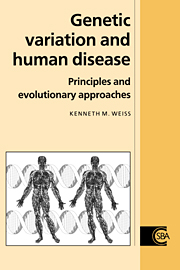Book contents
- Frontmatter
- Contents
- Frontispiece
- Preface: what is this book all about?
- Notational conventions used in this book
- List of abbreviations
- Part I Genes and their expression
- 1 What is a gene?
- 2 The logic of the genome
- 3 Concepts of frequency and association in populations
- 4 Genes and phenotypes in populations
- Part II Introduction to genetic epidemiology: inference from observational data
- Part III Evolution: the time dimension in populations
- Part IV Modification of the inherited genotype: the time dimension in individuals
- Afterwords: towards a unified general model
- References
- Index
2 - The logic of the genome
from Part I - Genes and their expression
Published online by Cambridge University Press: 05 June 2012
- Frontmatter
- Contents
- Frontispiece
- Preface: what is this book all about?
- Notational conventions used in this book
- List of abbreviations
- Part I Genes and their expression
- 1 What is a gene?
- 2 The logic of the genome
- 3 Concepts of frequency and association in populations
- 4 Genes and phenotypes in populations
- Part II Introduction to genetic epidemiology: inference from observational data
- Part III Evolution: the time dimension in populations
- Part IV Modification of the inherited genotype: the time dimension in individuals
- Afterwords: towards a unified general model
- References
- Index
Summary
We need not here consider how the bodies of some animals first became divided into a series of segments … for such questions are almost beyond investigation.
C. Darwin, The Origin of Species (1859)As the previous chapter indicated, a gene is much more, and more subtle, than simply a linear coding sequence. That sequence works only in the context of surrounding regulatory sequences and in the presence of the appropriate regulatory environment in the nucleus. Until recently, our knowledge of genetics was too rudimentary to enable us to make much headway in understanding how complex phenotypes result from genotypes. Darwin considered the problem essentially insoluble.
Phenotypes are also more complicated than can be explained simply by the linear coding sequence of a gene. Proteins have secondary and tertiary structures upon which their physiological functions depend. Even single proteins are only partial phenotypes, because their concentrations, induction, and tissue-specific environments and expression are also relevant to their action. Variation in regulatory and many other genes affects how the protein will function, just as variation in the sequence of the protein itself does.
An understanding of the relationships between genes and phenotypes requires an understanding of the logic by which life operates and has evolved. This is important because mutations can interrupt function at any point, and the pattern of pathology of a given genetic disease is often a direct reflection of where in the system the disruption occurs.
- Type
- Chapter
- Information
- Genetic Variation and Human DiseasePrinciples and Evolutionary Approaches, pp. 19 - 36Publisher: Cambridge University PressPrint publication year: 1993



